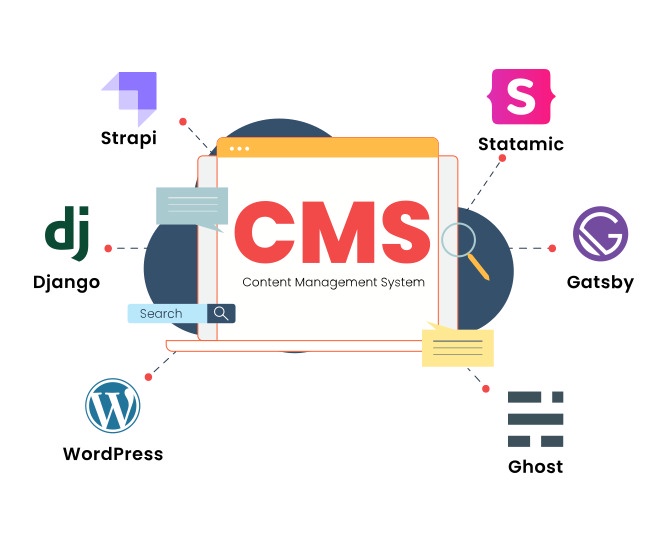Introduction
In today's digital age, businesses and organizations are increasingly adopting Content Management Systems (CMS) to manage their online content efficiently. As these businesses grow, the need for scalability, security, and accessibility becomes paramount. This is where content migration to the cloud comes into play. By transferring their CMS to the cloud, companies can leverage various benefits, including cost-effectiveness and enhanced collaboration. However, it's essential to weigh the pros and cons carefully before undertaking this journey. In this blog, we will explore the advantages, disadvantages, and best practices associated with content migration to the cloud.
Pros of Content Migration to the Cloud
- Scalability and Flexibility
- Cloud platforms offer the ability to scale resources up or down according to your needs.
- Easy to accommodate sudden traffic spikes or increased content demands without server limitations.
- Flexibility to adjust storage and computing resources, ensuring optimal performance.
- Cost Savings and Efficiency
- Reduce upfront capital expenses as there is no need to invest in expensive on-premises hardware.
- Pay for the resources you use, resulting in more cost-effective solutions.
- CMS development company can focus on core tasks instead of managing infrastructure.
- Enhanced Collaboration and Accessibility
- Cloud-based content can be accessed from anywhere with an internet connection.
- Multiple team members can collaborate simultaneously, improving productivity.
- Real-time updates and version control ensure everyone works on the latest content.
- Disaster Recovery and Data Security
- Cloud providers implement robust security measures to protect data from unauthorized access.
- Automatic backups and redundancy options prevent data loss in case of hardware failures.
- CMS development services can rely on cloud-based disaster recovery plans for business continuity.
Cons of Content Migration to the Cloud
Content migration to the cloud offers various advantages for businesses, but it also comes with some drawbacks that need to be considered, especially when working with a CMS development company or utilizing CMS development services. Let's explore these cons in simple terms with bullet points:
- Data Security and Privacy Concerns:
- Storing data on the cloud means relying on third-party servers, which raises concerns about data security and privacy.
- Data breaches or unauthorized access to sensitive information could occur, potentially leading to reputational and financial damages.
- Compliance with data protection regulations may be challenging, depending on the cloud service provider's location and policies.
- Potential Downtime and Connectivity Issues:
- Cloud services may experience downtime or outages, disrupting access to your content and services.
- If the CMS development company doesn't have a proper backup plan, data loss could happen during such disruptions.
- Internet connectivity problems can hinder access to cloud-hosted content, impacting productivity and customer experience.
- Dependence on Internet Connectivity:
- Accessing content on the cloud requires a stable internet connection, limiting offline access to critical data.
- Remote or rural areas with poor internet infrastructure may face difficulties accessing cloud-based content efficiently.
- Reliance on the internet can also increase the risk of workflow interruptions during network outages.
- Compatibility and Integration Challenges:
- Migrating content to the cloud might lead to compatibility issues with existing CMS development setups or other applications.
- Integrating cloud-hosted content with on-premises systems could be complex and time-consuming.
- The CMS development services may need additional effort to ensure seamless interaction between different cloud-based tools and services.
Best Practices for Content Migration to the Cloud
Content migration to the cloud can be a complex process, but by following these best practices, you can ensure a smooth transition and maximize the benefits of cloud technology.
- Thorough Planning and Assessment:
- Evaluate your current content management system (CMS) and infrastructure.
- Identify the goals and objectives of migrating to the cloud.
- Create a detailed migration plan with clear timelines and responsibilities.
- Consider the impact on users, workflows, and potential risks.
- Prioritization and Segmentation of Content:
- Prioritize the content that needs to be migrated based on its importance and relevance.
- Divide content into manageable segments or categories to migrate gradually.
- Start with less critical content to test the migration process before moving essential data.
- Data Backup and Contingency Plans:
- Ensure you have a robust backup strategy for all content before migration.
- Have a contingency plan in case of any unexpected issues or data loss during migration.
- Verify that the backup and recovery processes are fully functional before proceeding.
- Testing and Validation Procedures:
- Conduct thorough testing of the migration process in a controlled environment.
- Validate the integrity and accuracy of the migrated content.
- Involve key stakeholders in the testing phase to gather feedback and address concerns.
Conclusion
In conclusion, content migration to the cloud offers numerous advantages for businesses seeking streamlined content management. By partnering with a reliable CMS development company and embracing cloud-based solutions, organizations can enhance scalability, reduce infrastructure costs, and improve data security. However, it's crucial to be aware of the potential challenges, such as data migration complexities and reliance on internet connectivity. Adhering to best practices, such as thorough planning, testing, and regular backups, ensures a smooth and successful migration process. With careful consideration and expert assistance, businesses can harness the power of the cloud for efficient and seamless CMS development services.


No comments yet